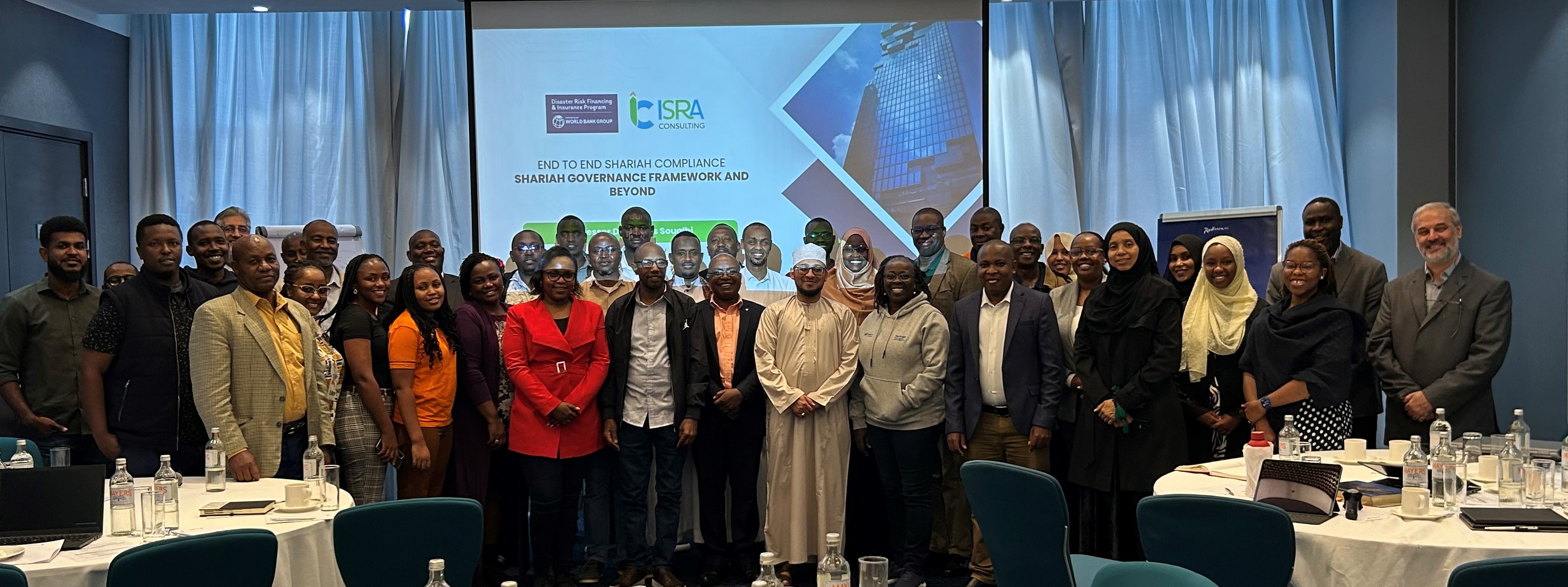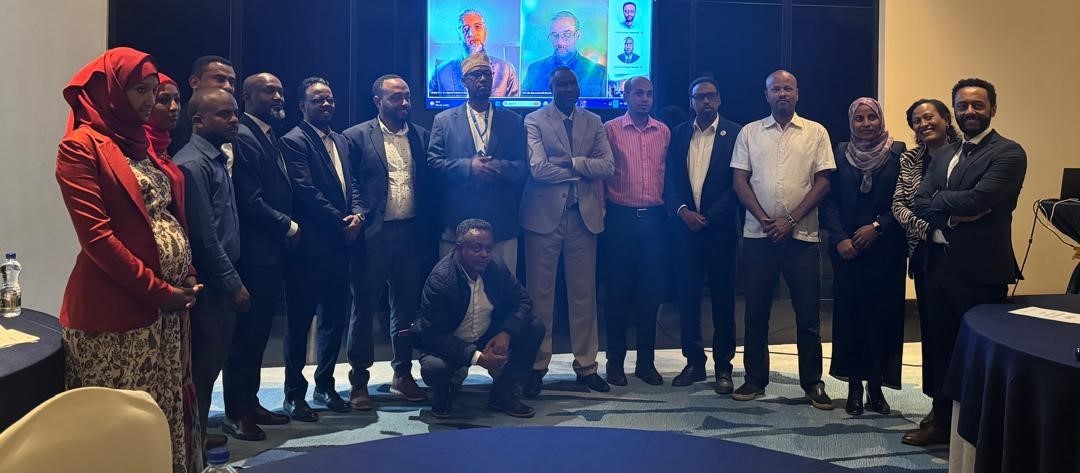[Event Recap] Islamic Finance Training under the Horn of Africa DRIVE project in Kenya and Ethiopia

The training group in Kenya
From the 20th to 25th June 2024, the World Bank’s De-risking, Inclusion, and Value Enhancement of Pastoral Economies in the Horn of Africa (DRIVE) Project organized a series of two-day training workshops on Islamic Finance in Nairobi, Kenya and Addis Ababa, Ethiopia. The objective of the training was to enable policymakers, regulators and the private sector to share their experiences and to learn from leading Islamic finance experts on the unique features of Islamic finance products and contracts, operational models, and Shariah governance. The training deepened the understanding of the principles, applicable Shariah laws and practices in Islamic finance, with a focus on takaful and Bancatakaful, Islamic Trade Finance and Islamic Capital Markets. The training varied slightly between the two countries. In Kenya, the training took a more introductory approach and was attended by 40 participants, whereas in Ethiopia, this training was project specific, targeted at 15 participants and aimed to address challenges of aggregation or group-based distribution of takaful and built on the introductory training that was held in December 2023.
The training was organized by the World Bank Disaster Risk Financing and Insurance Program (DRFIP) and financed by the Risk Finance Umbrella Trust Fund. It was delivered in partnership with the International Shariah Research Academy for Islamic Finance (ISRA) consulting, a subsidiary of the International Center for Education in Islamic Finance (INCEIF) University, that offers training in Islamic finance, economics, and Shariah, among other things. Prof. Dr. Younes Soualhi and Dr. Ziyaad Mohamed, globally leading experts and sharia advisors delivered the training in person in Nairobi.
The training program provided a comprehensive foundation in Islamic financial services, starting with the core principles and objectives, Islamic law and its sources, and different models takaful, and types of Retakaful. The program in Kenya explored Bancatakaful, examining its value proposition and different models. Participants also gained exposure to Islamic banking practices, Islamic trade finance. This extended to understanding Shariah governance frameworks and their implementation with a focus on managing risk of Sharia non-compliance and ensuring transparency.
Participants emphasized the great opportunities to develop Islamic finance industry in their countries, however, they highlighted several constraints such as lack of understanding of basic principles of Islamic finance and key features of Islamic finance products. “One of the key challenges we face is the need to diversify our offerings to meet the varied financial needs of our clients. The training provided my first introduction to Islamic finance, offering valuable insights into Shariah-compliant financial products. I plan to further explore the different product offerings within Islamic finance, as this knowledge will be instrumental in helping our institution expand its services and better serve our diverse client base” Lelo Sora, Senior Underwriter and Reinsurance Officer, Intra Africa Assurance Co. commented.
Both Kenya and Ethiopia are in the process of establishing Shariah governance frameworks for Islamic financial services. There are tradeoffs between a central sharia council with oversight across all sectors of the financial industry and a decentralized framework with separate bodies for Islamic Banking, takaful and capital markets, respectively. Selecting the appropriate option for each context is challenging given the limited availability of qualified experts and relevant governance experience. Overall, supporting the process of establishing Shariah governance framework, building the capacity of specialized local training institutions, designing specialized curriculum and certification may be critical for the growth of the Islamic finance industry in the two countries.
The training ventured into the Islamic Capital Market (ICM), with an overview of its structure, the Shariah governance framework and real-world experiences. The process and the basic rules to consider in designing Islamic capital market products was explained as Kenya’s Capital Market Authority is exploring issuing further Islamic Securities to diversify the capital market and attract ethical investors. Issuance of the first sukuk in Kenya in October 2023, which raised Ksh3 billion (US$20 million) for affordable housing took a long time due to lack of knowledge. A sukuk is an equity-type of Islamic financial investment product, whereby the investor holds a certificate representing individual ownership interests in a portfolio of eligible existing or future assets. The payout structure mimics that of a conventional bond, hence sukuks are commonly termed “Sharia-compliant” bonds. Innovative solutions such as climate risk related sukuk solutions and carbon credits were explored. Further support to Kenya’s Capital Market Authority efforts to increase technical capability could support Kenya’s ambitions to become a regional Islamic finance hub.

The training group in Ethiopia
The training also addressed DRIVE project implementation challenges. In Kenya several participants from insurance companies and the State Department of Livestock raised challenges they face in offering the DRIVE financial package to Muslim pastoralists who only want to deal with Shariah compliant institutions. Proposed solutions included on boarding Islamic financial institutions as underwriters and distributors. Takaful Insurance of Africa attended the training and expressed a strong interest in participating. In Ethiopia, the DRIVE Takaful product and its distribution process was reviewed by the implementing partners, and end to end Shariah compliance was clarified. Implementing partners include Shabelle Bank (an Islamic Bank which takes up a group policy on behalf of pastoralists), Nyala and Oromia Insurance companies (primary underwriters licensed to operate takaful windows) and ZEP-Re (facilitates aggregation of pastoralists’ contributions and Retakaful cover). Shabelle Bank confirmed clarity on Shariah compliance and committed to rolling out awareness creation efforts among pastoralists.
Post-training feedback revealed that over 90 percent of respondents found the content to be relevant and useful to their future work, with an overall positive satisfaction of the training course, and an improvement of over 30 percent in the topics covered. The feedback providers also emphasize the positive effect and value of bringing in participants from a variety of roles to the training together, bringing “flavor to the discussions.” The participants highlighted further topics that they would like to learn about in possible future trainings.
Overall, the training was well received by the participants and trainers too, showcasing the importance of this increasingly growing topic in the area.
If you would like to learn more about takaful, please read the following:
- Horn of Africa DRIVE Takaful Frequently Asked Questions (FAQ) - Please click here
- [Event Recap] Ethiopia and Somalia learn more about takaful insurance in the Takaful Capacity Building Program December 2023 - Please click here
- Webinar: An introduction to Takaful and lessons from the experience of the DRIVE project - Please click here
- [Event Recap] Webinar: The Challenges and Opportunities for Climate Risk Takaful in collaboration with Insurance Development Forum - Please click here